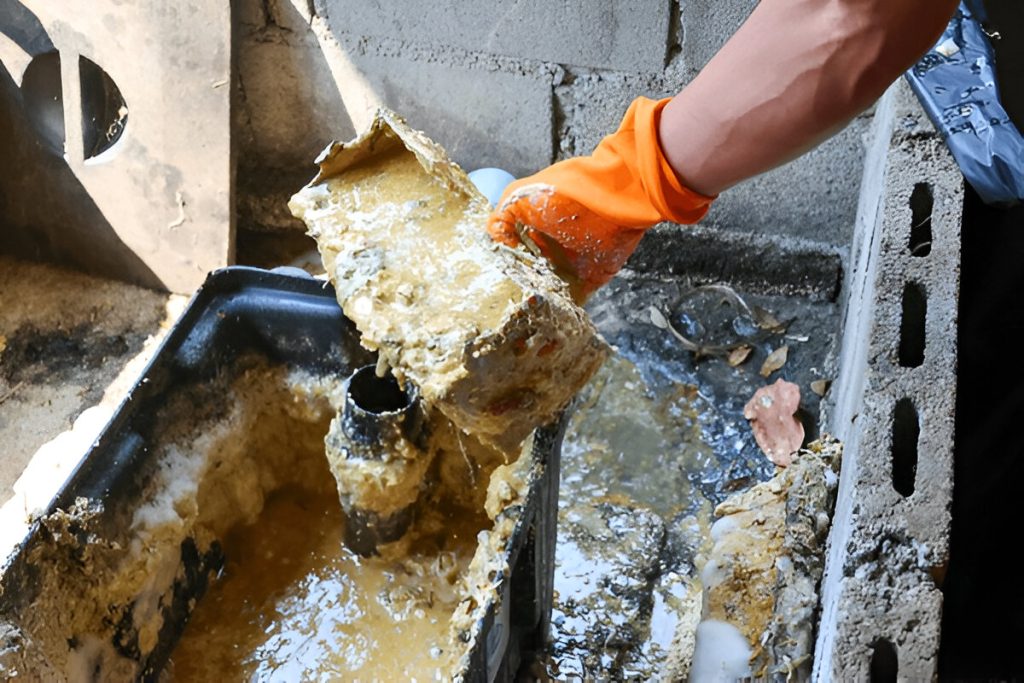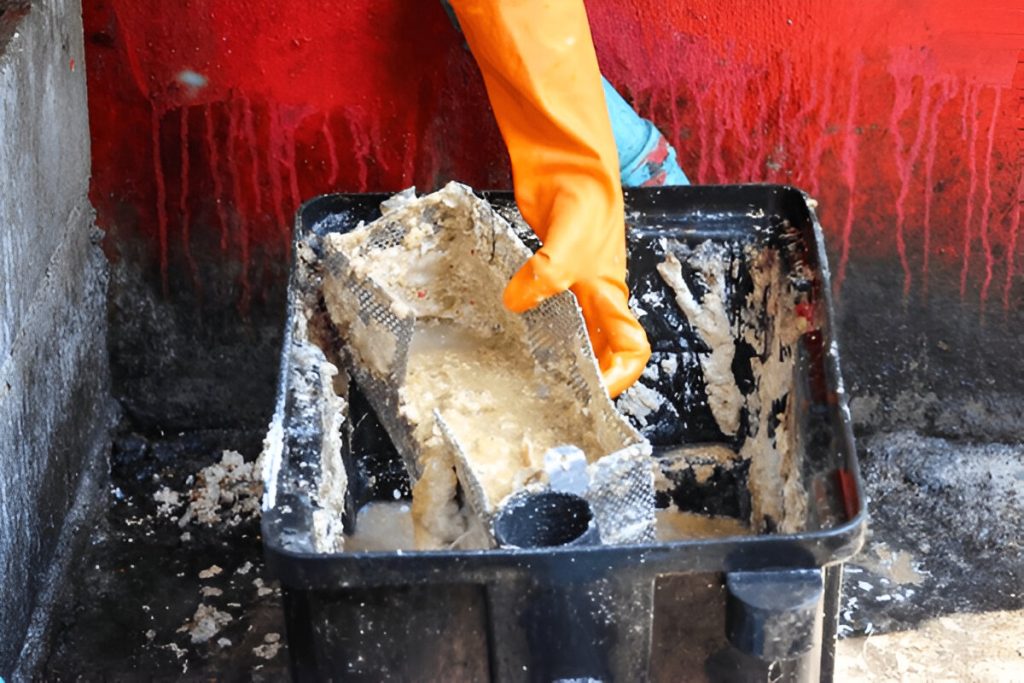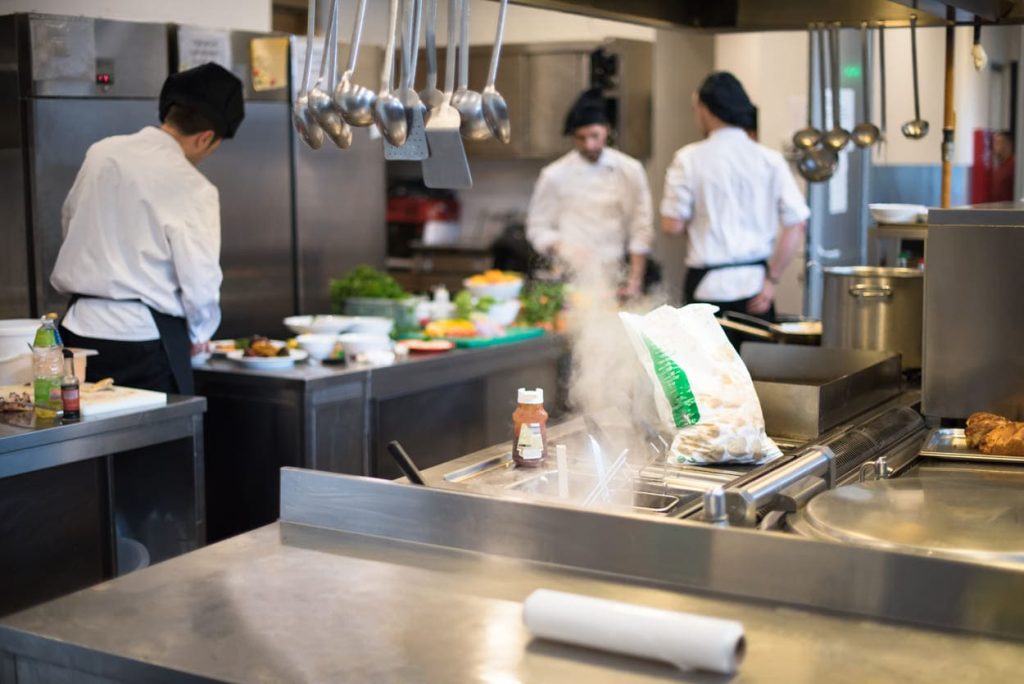Chicago Hood Cleaning
Grease Trap Cleaning in Warrenville, IL
Rated 5 stars on Google

Grease Trap Cleaning Solutions for Your Kitchen
If you’re not keeping up with grease trap cleaning, you might be facing some big challenges. Here are six common issues that we help business owners fix—before they turn into major headaches.
Unpleasant Odors
Full grease traps bring nasty smells. If your kitchen has a constant odor, it might be coming from a full or clogged grease trap.
Slow or Stopped Drains
A clogged grease trap can cause your kitchen sinks to drain slowly or even back up. Slow drains are a common problem caused by a full grease trap.
Health Code Violations
Grease trap problems can lead to health code violations. Neglecting grease trap maintenance could shut you down or result in hefty fines.
Grease Overflow
Overflowing grease traps lead to dangerous, slippery floors. An overflowing grease trap makes your kitchen a hazardous place to work.
Higher Plumbing Costs
A clogged grease trap can lead to expensive plumbing problems. Fixing that can be costly.
Uncomfortable Work Environment
No one wants to work—or eat—near bad smells and dirty drains. A clean grease trap improves kitchen safety and the overall work atmosphere.
Why Choose Us for Vent Hood Cleaning in Warrenville

Experienced Professionals
We’ve been in the business for years, offering expert grease trap cleaning services. Our team is highly trained to handle grease buildup and prevent common kitchen issues, ensuring your kitchen stays clean and operational.

Health Code
Compliant
We ensure your grease traps are up to code. Regular cleaning prevents violations and fines, so you can avoid costly problems and keep your kitchen in top shape for health inspections.

Prompt and Reliable Service
We understand the importance of keeping your kitchen running smoothly. That's why we offer fast, reliable grease trap cleaning services that won’t disrupt your business. We'll work around your schedule to minimize downtime.

Don't Let a Dirty Grease Trap Slow Down Your Warrenville Kitchen
You know that your kitchen is the heart of your business. One part of the kitchen that gets forgotten is the grease trap. While it’s out of sight, a grease trap can cause serious issues.
What is Grease Trap Cleaning?
Grease trap cleaning involves removing the buildup of grease and food waste from your kitchen’s grease trap. Grease trap cleaning keeps your kitchen flowing smoothly and meets health codes.
Why You Need Regular Grease Trap Cleaning
When you don’t clean your grease trap, it can create bigger problems. Regular cleaning helps avoid costly repairs and ensures your kitchen meets health and safety standards.
Problems You Can Solve with Grease Trap Cleaning in Warrenville
When you don’t clean your grease trap, it can lead to several problems:
Foul Kitchen Smells – A full grease trap produces foul odors that can fill your kitchen and spill out into your restaurant.
Clogged Drains – Clogged grease traps cause slow draining sinks.
Health Code Violations – Inspectors check grease traps, and neglecting it can lead to violations. A full grease trap may result in expensive fines or business shutdown.
Overflowing Grease Traps – When a trap overflows, it can send grease into your floors or drains. That’s messy, dangerous, and hard to clean.
Higher Plumbing Costs – Clogged grease traps lead to expensive plumbing problems. Ignoring your grease trap cleaning now could cost you big on repairs later.
Unhappy Staff and Customers – No one wants to work—or eat—near bad smells and dirty drains. Cleaning your grease trap ensures a healthier, safer, and more pleasant work environment.
Keep Your Kitchen Clean and Safe
Our professional grease trap cleaning service in Warrenville helps you avoid these issues and keep your kitchen in top condition. Our cleaning service makes sure your kitchen is safe, compliant, and fully functional. Let us keep your kitchen running smoothly—call us for prompt service.

We Proudly Serve in Warrenville
Warrenville, Illinois, located in DuPage County, has a rich history dating back to the mid-1800s when it was first settled. Originally known for its farming community, Warrenville has since transformed into a bustling suburb with a strong sense of community.
With its close-knit neighborhoods, top-rated schools, and abundance of parks and recreational facilities, Warrenville is a great place to live for families and individuals alike. The city’s convenient location near major highways provides easy access to nearby cities and attractions, making it an ideal place to call home.
Residents of Warrenville can enjoy a variety of amenities, including the Warrenville Park District, which offers sports leagues, fitness classes, and special events throughout the year. The city is also home to the historic Warrenville Tavern and the Warrenville Historical Museum, which showcase the area’s heritage.
As a grease trap cleaning contractor serving the Warrenville community, we would like to extend our heartfelt thanks to all of our customers for their continued support and business. We look forward to continuing to provide top-notch service to the residents of Warrenville for years to come.
Frequently Asked Questions
Grease trap cleaning is the process of removing built-up grease, food particles, and waste from your grease trap. This helps keep your kitchen’s plumbing system running smoothly, prevents bad odors, and ensures that your business is up to code.
The frequency of cleaning depends on the size of your kitchen and how much grease is used. Generally, it’s recommended to clean your grease trap every 1-3 months. Regular cleaning prevents overflow and keeps your kitchen running efficiently.
Regular grease trap cleaning prevents costly plumbing problems, bad odors, and health code violations. It also helps your kitchen stay sanitary and safe for both employees and customers. A clean grease trap ensures your business operates smoothly.
Neglecting grease trap cleaning can lead to foul odors, slow or clogged drains, plumbing backups, and even health code violations. It can also create an unhygienic environment, affecting both staff and customers.
The cleaning process typically takes 1-2 hours, depending on the size and condition of the grease trap. We work efficiently to minimize downtime for your kitchen and ensure everything is cleaned properly.
The cost of cleaning your grease trap varies based on the size and condition of the trap. However, regular cleaning is more affordable than dealing with plumbing repairs, health code violations, or a broken-down kitchen.
While it’s possible to clean your grease trap yourself, it’s best left to professionals. Our team has the experience and equipment to safely and thoroughly clean your grease trap, ensuring it’s done right and meets all local codes.
